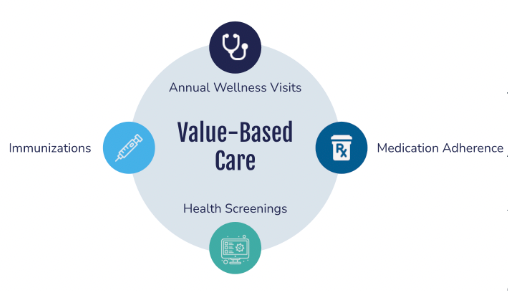Health Insurance Tips & Tricks
What is Value Based Care?

RateQuote Direct,

Value-Based Care is a healthcare delivery model that emphasizes improving patient outcomes and overall health while controlling costs. This approach shifts the focus from the volume of healthcare services provided to the value derived from those services. In a value-based care model, healthcare providers are incentivized to deliver high-quality care that leads to better patient outcomes and improved overall health.
Key components of value-based care include:
1. Emphasis on Patient Outcomes:
- The primary goal is to achieve positive health outcomes for patients. Providers are measured based on the health improvements and satisfaction of the individuals under their care.
2. Population Health Management:
- Providers consider the health of an entire population rather than just treating individual patients. This involves proactive measures to prevent diseases and manage the health of a community.
3. Care Coordination:
- Value-based care encourages collaboration and coordination among different healthcare providers involved in a patient's care. This can include primary care physicians, specialists, hospitals, and other healthcare professionals.
4. Preventive Care:
- There is a strong focus on preventive measures to keep patients healthy and avoid the development of chronic conditions. This may include routine screenings, vaccinations, and lifestyle interventions.
5. Patient-Centered Approach:
- Patients are actively engaged in their healthcare decisions. Shared decision-making and patient involvement in care plans are key elements of a patient-centered approach.
6. Payment Reforms:
- Reimbursement is tied to the quality of care and health outcomes rather than the quantity of services provided. Payment models may include bundled payments, capitation, or other mechanisms that reward providers for delivering effective and efficient care.
7. Health Information Technology:
- The use of electronic health records (EHRs) and health information technology is crucial for data sharing, care coordination, and tracking patient outcomes. It enables providers to have a comprehensive view of a patient's health history.
8. Performance Measurement and Reporting:
- Providers are assessed based on specific quality metrics, such as patient satisfaction, adherence to evidence-based guidelines, and health outcomes. Regular reporting and performance measurement help identify areas for improvement.
9. Risk Sharing:
- Providers may share financial risks with payers. This means that if the cost of care exceeds a predetermined amount, providers may be financially responsible. Conversely, if care is delivered efficiently and effectively, providers can share in the cost savings.
10. Continuous Quality Improvement:
- Value-based care is an iterative process that involves continuous evaluation and improvement. Providers actively seek opportunities to enhance care delivery, streamline processes, and improve patient outcomes.
The value-based care model aims to create a healthcare system that is more efficient, cost-effective, and focused on keeping individuals healthy. It represents a shift away from the fee-for-service model, where providers are paid based on the volume of services rendered, to a model that aligns financial incentives with the delivery of high-quality, patient-centered care. This approach has gained prominence as a means to address rising healthcare costs while improving the overall health of populations.
Recommended Posts

Switching from COBRA health insurance to Private health insurance.
Author RateQuote Direct

Navigating the Health Insurance Marketplace: A Guide to Enrolling with Confidence
Author RateQuote Direct

What is "SEP", Special Enrollment Period, for Health Insurance?
Author RateQuote Direct